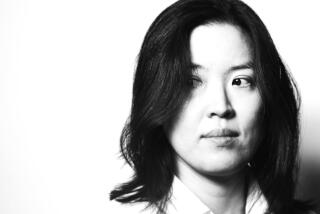Cold fact, sparkling fantasy
- Share via
ONE RECENT night, I read my 5-year-old daughter to sleep with a book about a little girl named Heart who discovers that there are real unicorns. At the end, it turns out that Heart is herself a unicorn, changed by enchantment into a human, condemned to a life of drudgery, and finally returned ecstatically to the magical world.
Jane asks me every few days whether I believe in fairies or whether there really are flying horses. It strikes me that her real life and her real world must already seem, in comparison to Barbie’s Fairytopia, to be a place that has lost its magic.
One certainly wants to affirm children’s wonder, to tell them that anything is possible, that dreams do come true. I cannot bring myself to tell my daughter flatly that there are no pixies among the flowers. But of course I can’t even entertain that notion, much less believe it. And I can’t help feeling that I am preparing her for a life of disappointment -- not with this or that unfortunate person or event but with the fabric of the universe as a whole. Believe in fairies long and hard enough, and you will grow to loathe the world.
Jane says of her 7-year-old friend, Emma, that she used to believe in fairies but that she doesn’t anymore. She has asked me whether she herself, when she grows up, will stop believing. I hope not. And I hope so. I don’t have a great deal of respect for adults who believe in fairies. Sane adulthood is entrapment in a world without magic, in a real world.
In the most fulsome and predictable terms, we often extol the imaginations of children. But as I participate in the delineation and preservation of the world of Janie’s imagination, I can’t help feeling my own disenchantment. The stories I tell my children crystallize my sense that this world is not good enough. And we are not good enough either: We are not princes and princesses; we do not have sparkly wings.
When I was a teenager, I read “The Lord of the Rings” a dozen times. Sometimes it felt more real to me than my life; certainly it was more satisfying. In reality, my quest was not clear, and the characters, including myself, were both good and evil, or neither. Day by day, my life seemed to me repetitive and typical to the point of idiocy: the school, the peanut butter and jelly, the date on Friday night. It was all routinized, exhausting, pointless. I feel that still, and then some.
Perhaps we are all feeling something like this at the moment. At least, “Harry Potter” and “Narnia” are our movies, “Harry Potter” and the fantasy of George R.R. Martin our books.
And it will not surprise you that I cannot merely abandon myself and consign my daughter to perfect disillusionment.
Between sessions with “The Unicorn’s Secret” and “A Feast for Crows,” I am reading the journals of Henry David Thoreau. Thoreau was an extraordinary person and writer because the world of his imagination -- as full of wonders as “Narnia” -- is this very world we inhabit. His observations of a seed, or of a fox, are as surprising as ours might be if we met a goblin or climbed a beanstalk.
Sometimes Jane asks me things like this: “Is there really such a thing as hot lava?” “Are whales real?” These questions surprise me and give me hope.
Before Jane was born, I lived in an old farmhouse. One summer night I was lying in bed with Jane’s mother. The night was moonless and the room was dark. At the edge of my vision I saw a tiny flash of light. I thought it must be a firefly. But the light started flashing and flitting around the room, much faster than any firefly could move. I watched the thing for a good five minutes.
I woke Marion up. She saw it too. I finally got up and turned on the light, but there was nothing there. A few days ago I finally, reluctantly, told that story to Jane.
More to Read
The biggest entertainment stories
Get our big stories about Hollywood, film, television, music, arts, culture and more right in your inbox as soon as they publish.
You may occasionally receive promotional content from the Los Angeles Times.









